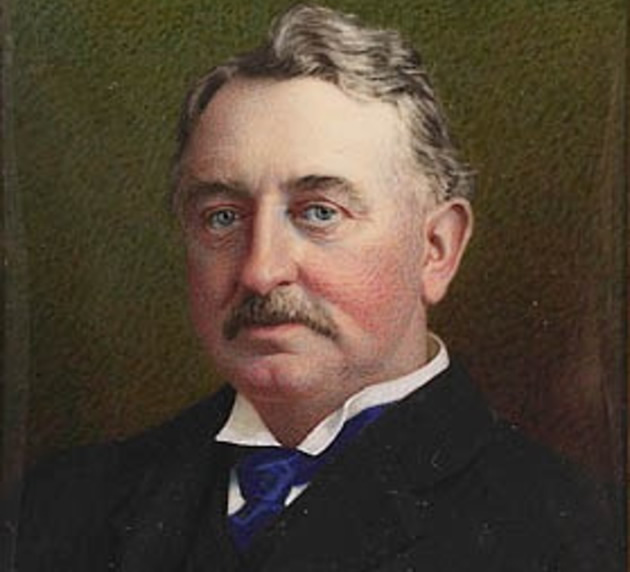Arch-pillager Rhodes was no philanthropist

Adekeye Adebajo Correspondent
Being a former Oxford University Rhodes Scholar and given the students’ furore calling for the removal of the Cecil Rhodes statue in front of the University of Cape Town (UCT), I was rather startled to read the views of Vice-Chancellor Max Price on the arch-imperialist as he said the student statue protest was “significant, but the greater debate around this is what really matters”.
Price seemed to be unwittingly acting like a pyromaniac fireman.
Although he conceded Rhodes’s “values and his ruthlessness, and his willingness to take the view that imperial ends were justified by any means, were appalling”, Price made the extraordinary statement: “I do believe there’s a risk of simplifying Rhodes… it’s important to examine why he came to be viewed as a great man. He achieved an enormous amount by the time he died… a businessman, diplomat and prime minister of the Cape, a military strategist and a philanthropist very committed to education, and in all these things he was successful.”
Let us examine each of Price’s claims. First, the idea of Rhodes as a diplomat is patently absurd, unless one views “diplomacy” as flowing out of the barrel of a Maxim gun. Rhodes seized, administered and populated African land with white settlers.
His genocidal “scorched earth” campaigns killed tens of thousands of people.
He dispossessed black people of their ancestral lands in modern-day Zimbabwe and Zambia through armed conquest in one of the most ignominious “land grabs” in modern history.
By 1890, Mashonaland had been seized, while farming claims had been staked out in Matabeleland by 1896. Rhodes’s British South Africa Company gave itself the right to half of the loot, with the rest being shared out among the motley crew of his settlers, freebooters, mercenaries and adventurers. The huge herds of Ndebele cattle were divided between the armed thugs and the British South Africa Company. Rhodes’s band of mercenaries raped, enslaved and stole Shona land in pursuit of mineral wealth.
Perhaps the diplomacy which Price is referring to is Rhodes’s use of agents to negotiate a concession with Ndebele king, Lobengula, who believed that he was only ceding limited mining rights, but ended up losing his entire country.
Or perhaps he is referring to Rhodes’s “negotiation” of a treacherous and dishonest accord in which the Ndebele and Shona were allowed to return to their land over which all rights had been revoked?
This is, surely, duplicity rather than diplomacy.
Killing thousands of people with superior technology was not – in contradiction of Price’s second claim – the actions of a great military strategist, but those of a pillaging plunderer.
Price’s third claim is that Rhodes was a great businessman. The imperialist, however, used his economic wealth (he controlled 90 percent of the world’s diamonds) to buy political power, and used political power to protect and extend his wealth.
He used shares and land to buy off politicians in Britain and South Africa, including members of the Afrikaner Bond. In cornering the diamond industry in Kimberley, he ruthlessly crushed many of the smaller businesses and tricked many of his opponents.
He manipulated the stock exchange and bought off people with company shares, outright bribes and job offers.
He had speculative shares in a shell diamond company in the early 1880s. He bought off rival entrepreneurs, politicians and journalists to further his expansionist aims. He misled investors and the British government into believing that his British South Africa Company owned the 1888 Rudd Concession to secure a royal charter.
Price’s fourth claim was to praise Rhodes as prime minister of the Cape Colony.
However, the imperialist used his rule between 1890 and 1895 to lay the foundations for apartheid and his premiership ended in disgrace when Leander Starr Jameson’s ill-conceived raid into the gold-rich Transvaal in 1895 failed, helping to trigger the Anglo-Boer War four years later.
Even before apartheid was passed into law in 1948, Rhodes was its forerunner, helping to disenfranchise black people through the introduction of new property and educational criteria in the Cape Colony.
He forcibly removed blacks to reserves through the 1894 Glen Grey Act, which presaged apartheid’s bantustan policies.
Rhodes further pushed the Cape parliament to introduce hut and labour taxes on blacks to force them into the cash economy; packed more than 11 000 black miners into inhuman, dog-patrolled, wire-protected barracks and supported draconian labour laws (including the legal flogging of “disobedient” black workers through the notorious “Strop Bill”), facilitating the continued supply of human fodder to his mines and impoverishing the black population.
As premier of the Cape Colony, Rhodes also introduced social segregation for “non-whites” in schools, hospitals, theatres, prisons, sports, and public transport; forced blacks to carry passes (a precursor to the dompas) and removed thousands of members of these groups from the colony’s electoral rolls.
Price’s fifth claim was that Rhodes was a great philanthropist. Aside from the difficulty of being generous with stolen booty, it is important to note that, though 7 688 Rhodes scholars have studied at Oxford University since 1903, the scholarship scheme excluded women until 1976 and had clearly been designed for a “heaven’s breed” of largely Anglo-Saxon white males. The Rhodes trustees themselves today remain mainly white men, while most of the scholarships still go disproportionately to white Americans, Canadians, Australians and South Africans.
Contrary to Price’s statement that Rhodes did not graduate from Oxford, the imperialist – who was not reputed to have been a particularly good student or a potential Rhodes scholar – took eight years to achieve a “gentleman’s pass” in law from Oxford.
The South African scholarships, from which Price himself benefited, have been controversial, effectively serving as a form of white “affirmative action” for over a century, disproportionately going to schools that did not admit blacks or girls until the 1980s. Only four of the first 80 scholars were black.
One must unequivocally reject Price’s argument that: “We are all, really, products of our time.”
Many of Rhodes’s contemporaries criticised him, including the writer Olive Schreiner, who wrote a devastating critique of his ruthless imperial methods in her 1897 novella, “Trooper Peter Halket of Mashonaland”.
Finally, Price makes the astonishing claim that Rhodes was “in many respects self-made, though he had the empire behind him”. This is a contradictory and confused claim. The British, in fact, granted Rhodes a royal charter to annex territory in Southern Africa.
The imperialist was allowed to dispossess the indigenous inhabitants and offer British soldiers land ownership in return for their military conquest.
This is not a record the UCT vice-chancellor should be defending. – Sunday Independent.










Comments